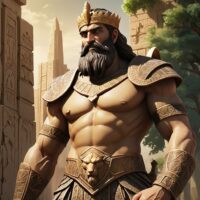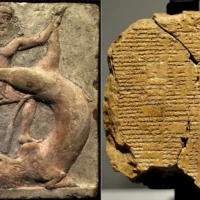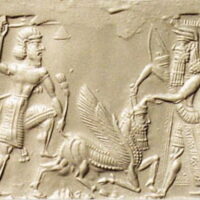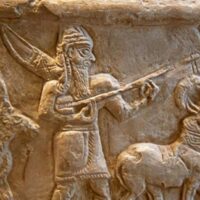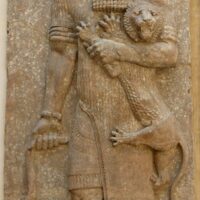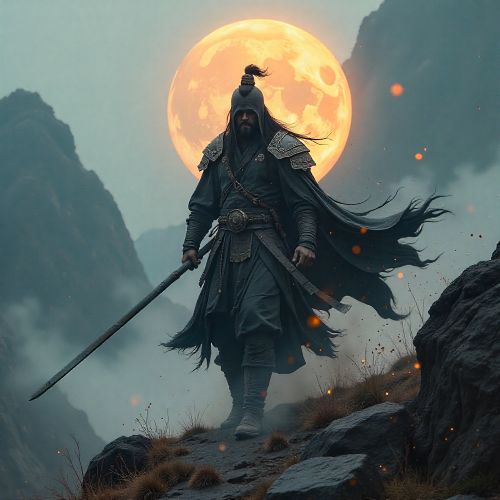Gilgamesh : The Mesopotamian Hero King of Uruk
Listen
At a glance
| Description | |
|---|---|
| Origin | Middle Eastern Mythology |
| Classification | Demigods |
| Family Members | Lugalbanda (Father), Ninsun (Mother) |
| Region | Iraq |
| Associated With | Battle, Royalty, Conquest |
Mythlok Perspective
From the Mythlok perspective, Gilgamesh represents the human confrontation with mortality as an essential part of heroic becoming rather than a failure of strength. His journey from tyrant king to seeker of eternal life reveals wisdom born of loss and acceptance. When compared cross-culturally, Gilgamesh mirrors figures such as Achilles in Greek lore and Sundiata in West African tradition, yet differs in emphasis. Where Achilles remains defined by rage and honor, and Sundiata by destiny and legitimization, Gilgamesh’s transformation arises from an existential encounter with finitude. This contrast highlights a Mesopotamian worldview in which meaning is forged through relational bonds and an acceptance of the limits of life.
Giglamesh
Introduction
Gilgamesh is a prominent figure in ancient mythology, primarily known through the Epic of Gilgamesh, a foundational literary work from ancient Mesopotamia. Originating in the city of Uruk, his story unfolds in a region integral to Sumerian, Akkadian, and later Babylonian civilizations. Gilgamesh represents the complexities of human nature, with themes exploring friendship, mortality, and the quest for eternal life. The Epic of Gilgamesh, dating back to the third millennium BCE, is one of the earliest known literary works. Written on clay tablets in cuneiform script, it offers invaluable insights into the beliefs, values, and cultural practices of ancient Mesopotamia. Gilgamesh is depicted as both a tyrannical king and a seeker of wisdom, reflecting the duality inherent in human nature. As a legendary king, often portrayed as part human and part divine, Gilgamesh has captivated the human imagination for millennia. His tales blend historical facts with mythological elements, making him a central figure in Babylonian, Sumerian, and Akkadian mythology.
Physical Traits
In the Epic of Gilgamesh, the hero is portrayed with remarkable strength and physical prowess, befitting his status as a legendary figure. Often depicted as two-thirds divine and one-third human, his extraordinary abilities and striking appearance set him apart. His impressive physique and stature contribute to his roles as both a formidable warrior and an influential leader. His divine lineage is evident in his commanding presence and majesty. Gilgamesh’s physical dominance is showcased through his accomplishments, such as conquering wild beasts, leading battles, and constructing the protective city walls of Uruk. These feats underscore his role as a protector and ruler, although he occasionally grapples with the burdens of power. Throughout various versions of the epic, Gilgamesh’s superhuman strength and imposing stature remain consistent, reflecting his status as a demigod. This portrayal of his physical capabilities and heroic deeds highlights his ability to overcome significant challenges and adversaries. Despite variations in his exact appearance, the enduring image of Gilgamesh as a powerful and charismatic leader remains central to his legacy.
Family
Gilgamesh’s family background is pivotal to his status as a semi-divine hero. His mother, Ninsun, is a goddess renowned for her wisdom and often provides guidance throughout his adventures, underscoring his divine connection. His father, Lugalbanda, was a mortal king known for his magical abilities, which highlights Gilgamesh’s human aspects. This blend of divine and mortal heritage creates an internal conflict for Gilgamesh, as he contends with his own limitations and ambitions. Despite his extraordinary lineage, he encounters human experiences such as grief, fear, and the acknowledgment of his mortality. Different accounts of his ancestry reflect varying degrees of divine and human elements. Regardless, Gilgamesh is predominantly celebrated as the king of Uruk, known for both his leadership and heroic feats. His family background, combining divine wisdom and mortal authority, significantly influences his actions and the obstacles he faces throughout his life.
Other names
Gilgamesh’s legacy is reflected in the various names and titles he has been given throughout history, illustrating his widespread influence. In Sumerian texts, he is known as “Bilgamesh,” while Akkadian and Babylonian sources use “Gilgamesh.” His kingship and heroic status are often highlighted by titles such as “Lord of Kulaba” and “King of Uruk.” These variations underscore how his story adapted across different cultures and languages. The different names, including “Bilgames” in Sumerian, point to the evolving nature of the Gilgamesh legend over time. These alternate names and titles reveal the extensive reach and adaptation of his mythos in Mesopotamian culture.
Powers and Abilities
Gilgamesh’s extraordinary abilities are fundamental to his legend, emphasizing his role as a formidable hero. His unmatched strength allows him to conquer significant adversaries, such as the demon Humbaba and the Bull of Heaven, highlighting his protective role and his defense of civilization against chaos. Beyond physical might, Gilgamesh’s intelligence and leadership are evident in his successful governance and architectural achievements in Uruk. His quest for wisdom and immortality reflects his deep curiosity and drive for self-discovery. His relationship with Enkidu, a divine wild man, is pivotal for personal growth, teaching him compassion, humility, and acceptance of mortality. Despite his superhuman qualities, Gilgamesh’s journey underscores his struggle with human vulnerabilities and his pursuit of understanding.
Modern Day Influence
Gilgamesh’s narrative endures in modern culture, leaving a lasting impact on literature, art, and popular media worldwide. The themes from the Epic of Gilgamesh, including the quest for meaning and the acceptance of mortality, continue to engage contemporary audiences. This timeless relevance has led to numerous adaptations and interpretations, affirming Gilgamesh’s lasting influence.
In literature, the Epic of Gilgamesh has been instrumental in shaping the concept of the epic hero and exploring the human condition. It has inspired comparisons with other mythological and literary figures like Odysseus, Hercules, and King Arthur. The story’s impact extends to modern novels, poetry, and plays, where its themes are frequently reimagined.
Visual arts have also been influenced by Gilgamesh’s story, with many artworks illustrating scenes from his adventures. These depictions often focus on his interactions with supernatural entities and his pursuit of immortality, reflecting the rich mythological imagery associated with him.
In popular culture, Gilgamesh has made appearances in films, television shows, and video games, where his character and exploits are reinterpreted for new audiences. His presence across various media highlights his significance as a legendary figure in world mythology. The Epic of Gilgamesh remains a foundational text, inspiring writers and artists globally and ensuring his place as a timeless icon.
Related Images
Sources
Black, J., & Green, A. (1992). Gods, demons and symbols of ancient Mesopotamia: An illustrated dictionary. University of Texas Press.
Dalley, S. (1989). Myths from Mesopotamia: Creation, the flood, Gilgamesh, and others. Oxford University Press.
Encyclopaedia Britannica. (2025, December 5). Epic of Gilgamesh. https://www.britannica.com/topic/Epic-of-Gilgamesh
George, A. R. (2003). The Babylonian Gilgamesh epic: Introduction, critical edition and cuneiform texts (Vol. 1). Oxford University Press.
Metropolitan Museum of Art. (n.d.). Gilgamesh, king of Uruk. https://www.metmuseum.org/essays/gilgamesh
Sandars, N. K. (1960). The epic of Gilgamesh (Penguin Classics). Penguin Books.
Smith, G. (1872). The Epic of Gilgamesh (translation discovery). British Museum Archives.
Stud-Lib. (n.d.). Epic of Gilgamesh: History, versions, and discovery. https://studylib.net/doc/25478606/gilgamesh
Watch
Frequently Asked Questions
Who was Gilgamesh in ancient Mesopotamia?
Gilgamesh was a semi-divine king of the Sumerian city of Uruk, best known as the protagonist of The Epic of Gilgamesh, one of the oldest surviving epic poems in world literature.
What is The Epic of Gilgamesh about?
The Epic of Gilgamesh recounts the adventures of Gilgamesh and his companion Enkidu, exploring themes of friendship, heroism, loss, and the quest for eternal life.
Why did Gilgamesh seek immortality?
After the death of Enkidu, Gilgamesh becomes acutely aware of his own mortality and journeys to find Utnapishtim, a figure who survived a great flood, hoping to discover the secret to eternal life.
Is the story of Gilgamesh real history or myth?
While some rulers named Gilgamesh may have existed historically in early Uruk, the epic itself is a mythological and literary work that blends history with symbolic storytelling.
What cultural influence does The Epic of Gilgamesh have?
The Epic of Gilgamesh influenced later literary and religious traditions by articulating profound inquiries into the human condition, including parallels to the flood stories found in other ancient cultures.


